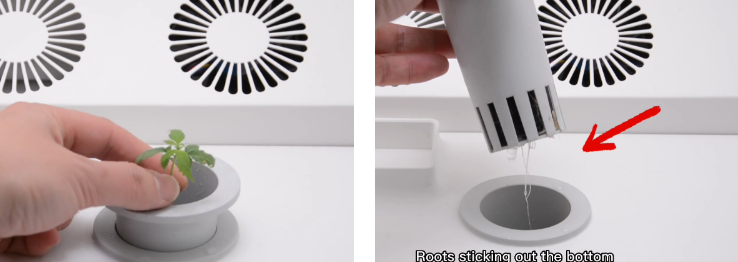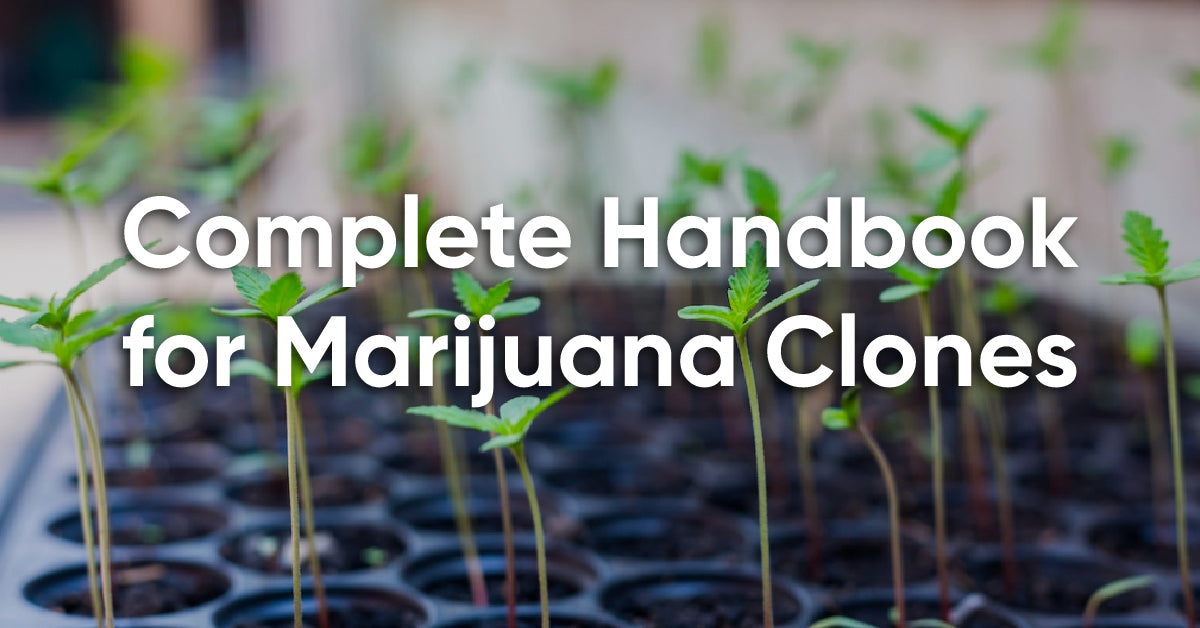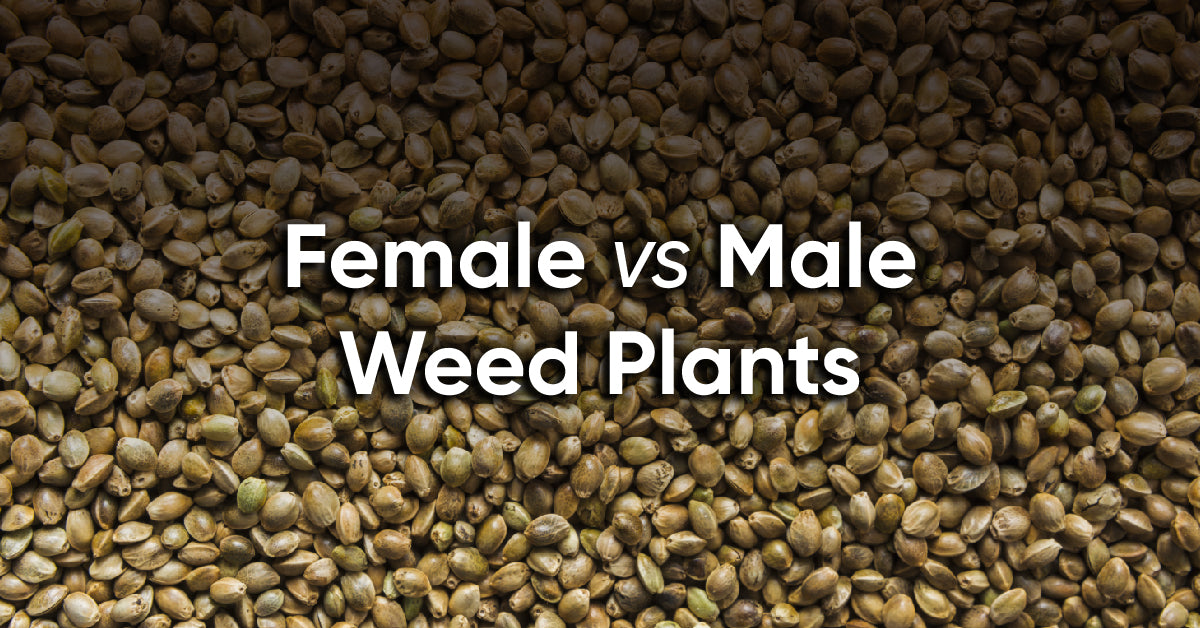Germinating Cannabis Seeds: A Comprehensive Tutorial for Beginners
If you're looking to grow a weed plant with stronger, more robust genetics, then starting from seed is the way to go (compared to marijuana clones)!
Today we will discuss and go over the entire process of germinating cannabis seeds. We'll cover some tried and true methods of seed germination & sprouting, and explore various seed types, unveiling the secrets to a successful start on your cannabis growing journey.
Feminized Seeds vs Regular Seeds
Before we talk about how to germinate cannabis seeds, you will need to know the different types of seeds. There are two basic kinds of seeds:
- Feminized seeds: they have been bred/produced to grow only female plants;
- Regular seeds: they have not been bred to produce a specific sex of plant.
When growing with feminized seeds, you're cultivating a seed specifically bred to produce only female plants which will produce flowers. Regular seeds have not been specifically bred to produce only female ones, and carry a possibility of growing into male or hermaphrodite plants, which might generate pollen or seed-filled flowers.
Unfortunately, it is impossible to identify the sex of a seed (male/female/hermaphrodite) solely by looking at it; it becomes evident only once the plant enters the blooming stage.
Germination & Sprouting Phases
When it comes to growing and germinating cannabis seeds, there are two distinct stages.
Germination Phase

Cannabis seed germination is the initial stage where seeds absorb water, which causes them to swell and begin to break out and exit dormancy. The seed shell will crack, allowing the internal embryo to emerge (the taproot is part of the embryo). During the germination stage, cotyledon leaves, that is the first set of leaves, will also start to develop inside the seed.
Sprouting Phase

Sprouting occurs after the cannabis seed has germinated, signifying the continued growth past the germination stage. During this sprouting stage, you'll witness the first visible signs of growth as they emerge from the grow medium. This includes the elongation of stem, expansion of cotyledons, which will eventually give way to the first real set of leaves! The cannabis plant will start to develop its root system.

Expert Growing Guidance
Connect directly with our team of growing experts in a chat to get your cannabis plants back on track.
Let's Chat!Seed Germination: 5 Key Factors for Success
Verified Sex/Genetics
Before growing or germinating cannabis seeds, make sure you're purchasing feminized seeds from a reputable and established vendor or breeder. The production of female seeds involves precise breeding techniques, and purchasing from a reputable breeder greatly enhances the likelihood of receiving genetics with a proven track record. Many renowned breeders won't put genetics out until they have been able to successfully harvest the strain grown from their seeds!
The "Eye Test"
Healthy cannabis seeds usually have a certain appearance. Typically, they will be round and bulbous, and dark in color, with a striped pattern on the seed shell. These are all signs that the seed is healthy and will produce a strong plant after your germination!
Soaking the Seed
Upon the first step in germinating cannabis seeds, many growers will soak their seeds in water to test for viability. While soaking the seed, if it does not sink, high chances are the seed isn't viable!
Temperature
When germinating cannabis seeds, keeping the environment around 75°F (24°C) is ideal, and will increase the chances of getting a strong taproot!
Moisture
Moisture is key throughout the seed geminating and sprouting process! You don’t want the seeds to dry out. if so, chances are that the seed will die, or produce a weaker seedling and plant later in life. We'll delve into the exact watering schedule in the following section.
Steps of Germinating Cannabis Seeds
If done right, germinating cannabis seeds can be a very simple process. Let's get into the details of how to do it!
1. Soaking the Seed

To successfully germinate seeds, this is the first step you'll take, as it makes sure that the seed you're using is healthy and able to germinate.
To soak a seed, simply:
- Fill up a cup halfway with water;
- Add the seed in;
- Poke or stir the seed gently to remove any air bubbles around the seed and ensure it's completely surrounded by water;
- Place the cup in a dark placethat's neither too hot nor too cold, and let the seed soak for 24 hours.

After 24 hours, check the seed. It should have sunk and may have even developed a taproot! If the seed did not sink, or did not produce a taproot or "tail," stir the water again and give it another 24 hours.
After a total of 48 hours, if the cannabis seed still hasn't sunk, it's not viable and can be discarded.
If it did sink, but didn't produce a taproot, move it to a moist paper towel. Fold the towel around the seed, place it in a plastic baggie, and put the bag in a warm, dark area. It should be able to push a taproot out in about 1 day!
2. Sprouting the Seed & Giving It Light
To proceed with germinating cannabis seeds, the next step is to get it to sprout! You can follow these steps:
1. Choose your preferred growing medium, such as soil, rockwool, or coco coir - these are the most common choices.
2. Plant the seed with the taproot facing downwards. In the case of growing with soil or coco coir mediums, don't bury the seed too deep. Just create a small hole with your pinky finger, about 1 knuckle deep!

At this time the seed will need light to sprout! Plants have the tendency to grow towards the sun, so the light gives the marijuana seedling a direction of growth, a phenomenon known as phototropism. Therefore, focus more on providing sufficient light coverage rather than light intensity.
If you are using the sun as your light source, you may want to move the seedling around in accordance with the sun pattern to make sure it gets enough light throughout the day. Try to keep the seedling under direct sunlight and out of shadows.
3. Watering
Once the taproot-facing-down seed has been planted, in the coming days you'll see the seed's shell or "coat" cracking, with the first signs of the actual plant emerging.
At this point you should be keeping the growing medium moist. It should be neither overly wet nor dry. Roots strive for water, therefore they'll grow out and search for it. To assist the roots in growing long and strong, it’s best to maintain a consistently moist but not soaked medium.
This may require watering daily, or every other day. Gauge the moisture level by feeling the medium to determine whether it needs watering.
4. Feeding

Now that your seedling is getting adequate light and water, you'll soon see two round, small leaflets unfurl, which are exactly cotyledons. Cotyledon leaves play a vital role in the plant's early growth. They help the cannabis plant to establish the process of photosynthesis, and they themselves will serve as a source of nutrition. As the plant grows, you will see these leaves turn yellow and eventually die off, usually after the second set of leaves (the first true leaves of a cannabis plant, with jagged edges) appears.
At this time the plant is still very fragile and delicate. Novice growers may mistakenly believe that the cannabis seedling is ready for transplantation, feeding, or handling as soon as the cotyledons appear, but these actions can stress the seedling to the point of death.
You don't need to give the seedling any nutrients until it has its first set of true leaves, and an established root system. Once you reach this stage, you now have a fully-grown seedling ready for the vegetation stage. Congrats!
How Long Does It Take for Seed to Germinate?
The duration of germinating a seed depends on environmental conditions, seed viability, and the method used. Cannabis seed germination process can take anywhere from 2-7 days, while the sprouting process may last 5-14 days. In general, from seed soaking to the first time you see the signs of growth, the process might take around 17 days.
Any Simpler Ways to Germinate Cannabis Seeds? Sure, Look at Hey abby!
After the detailed guide described above, you might be thinking it's quite a journey to nurture your cannabis seed into a healthy seedling. This is precisely why many growers opt for clones to skip the hassles.
However, Hey abby, a leading provider of intelligent, all-in-one cannabis grow tent kits, simplifies this process.
You won't have to tinker with environmental parameters; the machine ensures your cannabis seed's successful germination with automated precision. While the average germination process can take up to 17 days, Hey abby streamlines it to 7-10 days by creating the ideal climate within the marijuana grow system. In a shorter timeframe, your cannabis seedling will be primed for the subsequent vegetative stage.
Germination Tools Included with Hey abby Grow Box Kit

- Plant cup * 1
- Plant basket * 1
- Round sponge * 1
- Square sponge * 1
Step-By-Step Guide to Germinating Cannabis Seeds within Hey abby
Here's a concise guide on how to germinate cannabis seeds with Hey abby:
Day 1-4

1. Fill the plant cup with tap water until it is about 1 inch high. Put your feminized seed in the cup, and let it soak there until a tap root forms. During this phase, lighting is not necessary. The majority of seeds sprout within 2-4 days.

2. After the seed has germinated, carefully place the tap root (make it face downwards) inside a moist cubic sponge. Make sure the seed itself can be seen on the sponge's surface. Next, put the entire sponge into your plant basket.

3. Add an inch of tap water in the plant cup, and insert the plant basket into the plant cup again. Ensure the water level doesn't exceed the sponge.
4. Put the plant cup into Hey abby automated grow cabinet, confirming it's set for the germination stage. The light inside the machine will be automatically turned off for a few hours to support seedling growth.
Day 4-10
Now, your cannabis seedling is set for success since you've entered the second phase of germinating a seed.
Replace the water in the cup every 2 days to prevent the formation of bacteria.
*Notes: The seedling doesn't need nutrients yet because the proteins in the seeds and the minerals in the tap water are adequate for her growth.

When you notice two sets of leaves and find the roots extend out of the bottom of the plant basket, the seedling is ready for the following veg stage.
Conclusion
Germinating cannabis seeds marks the first growth stage of a weed plant, and will set the foundation for the plants future! Ensure attentive care throughout this crucial process. Happy growing!
Get Weekly Expert Tips, and Grow Healthy Plants
Join our newsletter to get exclusive growing tips delivered directly to your inbox.



